Source: Religion News Service
His baptizing of a gay couple’s children is only the most recent case in point.
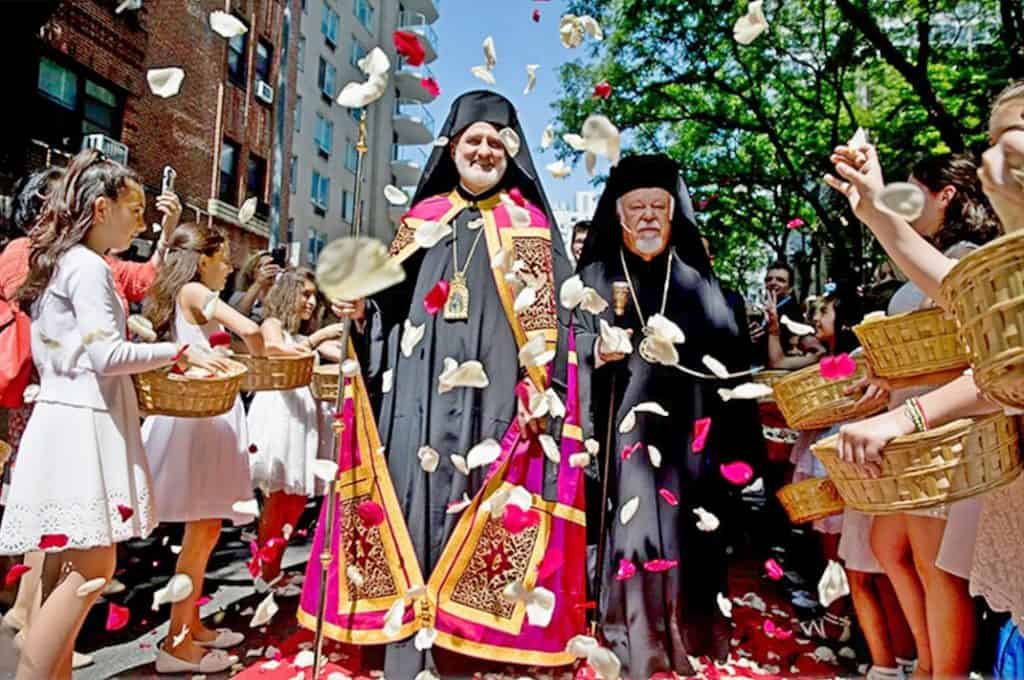
Archbishop Elpidophoros, center left, and Metropolitan Augoustinos of Germany, center right, walk toward the Archdiocesan Cathedral of the Holy Trinity for Elpidophoros’ enthronement ceremony as the new archbishop for America, as young girls throw flower petals, on June 22, 2019, in New York. (AP Photo/Julius Motal)
By
(RNS) — A couple of weeks ago, Elpidophoros, the Greek Orthodox archbishop of America, showed up in a seaside resort near Athens and baptized the son and daughter of a prominent gay couple, actor Evangelo Bousis and fashion designer Peter Dundas. The baptism, which was followed by a meal and “wild party,” was widely publicized.
And it created a bit of a furor in the Church of Greece.
As Orthodox protocol requires, Elpidophoros had informed the local metropolitan bishop that he would be performing a baptism in his diocese — but not that it would be on behalf of a gay couple. At least that’s what the metropolitan, Antonios of Glyfada, claimed after news of the event occasioned an “uproar” over what was thought to be “the first openly gay baptism” in Greece.
Antonios laid out his grievance in a formal letter of complaint to the Greek synod, whereupon the synod voted unanimously to send its own letter of protest to Elpidophoros and to forward that letter to the Ecumenical Patriarchate of Constantinople (Istanbul), which oversees the American archdiocese.
This elicited a full-throated defense of Elpidophoros in the form of a Religion News Service op-ed from the Rev. John Chryssavgis, a deacon in the American church and theological adviser to Ecumenical Patriarch Bartholomew, whose works he has edited and biography he has written. You don’t have to be an expert in Byzantine politics to reckon the op-ed as a riposte from Constantinople.
Asking rhetorically whether notification is expected when parents are single, atheist, civilly married or unmarried, Chryssavgis declared, “There should be no controversy over a baptism, to which all children are entitled.” He did not hesitate to call out by name Greek bishops who criticized the baptism and suggested it was time for “a frank discussion about sex and gender in the church.”
As for Elpidophoros himself, while he has thus far kept mum on the issue, this is not the first time since taking the reins of the American archdiocese three years ago that he has fluttered conservative Orthodox dovecotes.
Tapped as the Orthodox leader to give the opening prayer at the annual anti-abortion March for Life last January, he began with an obligatory “We affirm the gift and sanctity of life — all life, born and unborn.” But then he went on to say, “At the same time, we also affirm our respect for the autonomy of women,” noting how the Virgin Mary “freely chose” to bring Jesus into the world.
“We march not for coercion,” he said. “We march with compassion. With empathy. With love. And with our arms extended to embrace all.”
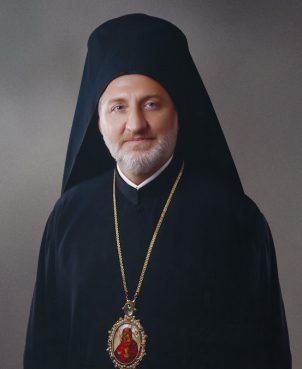
Archbishop Elpidophoros of America. Courtesy photo
This acknowledgment that there was another side to the abortion question did not sit well with a segment of the Orthodox Twitterverse or with the presiding hierarchs of four other American Orthodox churches (Antiochian, Bulgarian, Romanian and Serbian), who proceeded to issue a rejoinder.
“The Orthodox Church is, and always has been, unabashedly pro-life, regarding abortion as the killing of another human being,” they asserted. “In recent weeks, this position has been called into question, and, consequently, we, Orthodox Presiding Hierarchs representing several canonical jurisdictions in the United States of America, are compelled to proclaim the only true and correct teaching of the Church on this matter.”
On another front, two years earlier, Elpidophoros took the position that a non-Orthodox person who marries an Orthodox person in a Greek Orthodox church may receive Communion. Conservative hackles were raised by this apparent violation of Orthodox canons.
To understand where Elpidophoros is coming from, take a look at the lecture on Orthodox-Catholic relations he gave at Fordham University in September 2020. There he called for overcoming the “oxymoron” of letting the Eucharist (“the sacrament of unity par excellence“) come between the kind of interfaith couple that Greek Orthodoxy allows to be married in church.
Do we do it by practicing oikonomia, pastoral compassion, and accepting a measure allowing the non-Orthodox Christian spouse to receive Holy Communion? Today, in this unique context of Orthodoxy in the diaspora, we are able to examine the issue of Communion, that is contingent on the fact that we allow ecumenical couples to marry.
The principle of oikonomia, advanced by the fourth-century Cappadocian fathers, is all about recognizing that strict adherence to religious rules and regulations should at times yield to the realities of a fallen world. In Orthodoxy it is perhaps most evident in a willingness to allow the divorced to marry in church a second and even a third time — though with a liturgy less celebratory than what is laid on for first marriages.
To be sure, there has always been resistance to oikonomia within Orthodoxy. (In America these days that resistance is often coming from evangelical converts to a tradition they wish to make front and center in the culture wars.)
Pope Francis may be said to have embraced the principle when he permitted the bishops of his church to allow divorced and remarried Catholics to receive Communion. It’s pretty clear that Elpidophoros, a Constantinopolitan by birth, is cut from the same pastoral cloth.
Related Articles
A tempest over a baptism in Greece raises questions about what we’re trying to protect
On Baptizing Infants – No Other Foundation (Ancient Faith Ministries)
First Greek Orthodox Baptism for Child of Gay Couple in Greece – Greek Reporter

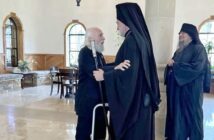
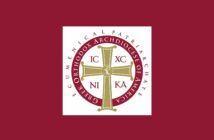
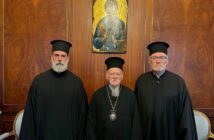
18 Comments
ELPIDOFOROS MUST RESIGN!
This is biggest False Prophet of Greek Church
& he’s really a Turk!
Respectfully, the principle of oikonomia applied to the non-Orthodox spouse of an Orthodox couple married in the Church, a spouse who is a sincere believer in Christ and in Holy Communion as taught by the Church, is a prudent principle and a welcome one for many of us, priests and laity. The idea of “autonomy” is different, a principle that is intrinsically questionable for all, male and female alike, as servants of Christ and obedient worshipers of Almighty God. Autonomy has become the siren call of modernity driving a run-away train in secular society and generating so much confusion regarding gender that any tumult in a boy’s or girl’s teenage heart may quickly lead to the regrettable answer of gender change, a most serious matter! When new and seemingly radical steps in language or action are taken, which perplex and confuse the Orthodox faithful, those steps bear the responsibility of public explanation prior to and certainly after the fact, for the sake of clear teaching and the instruction of God’s people. Respectfully, Fr. Theodore Stylianopoulos
Fr Ted, if a spouse is a “sincere believer in Christ and in the eucharist as taught by the church”, why not become Orthodox. I don’t think the AB views the issue of the eucharist as you present it. His agenda is different and dominated by a secular liberal perspective. I don’t think faith in Christ is central for him and besides how does one determine the criteria you establish. Can you imagine granting the eucharist to one non-Orthodox spouse and not another. If his goal is to become more inclusive, which is what I believe is his intention, he needs to stop making Hellenism central to his messages and preach Christ. Additionally, he needs to quit referring to the church as an homogenia. The GOA, is not an homogenia nor did Christ intend to establish an homogenia.
Dear JK,
The hope in good faith is that the devout non-Orthodox spouse who is inspired by and participates in Orthodox worship, would gradually come to the decision of full entry into the Church, moving beyond personal and family hesitations. Holy Communion is received by some Orthodox Christians without full awareness of the meaning of the sacrament. The priest bears the responsibility now and then to teach the people, remind them of the significance of the Eucharist, and telling them of their own personal responsibility to be prepared to receive Holy Communion, without the priest having to remind them again and again, or acting like a judge or a lawyer. The same would apply to non-Orthodox spouses married in the Church and lovers of Orthodox worship. I am expressing a view, not any sort of final position needing episcopal blessings. My other comments refer to the cited issues in principle and not necessarily to any specific events or persons.
Fr Ted, I think you underestimate the pressure your suggestion would put on a parish priest. It would be difficult to reject the spouse of a prominent member of the parish regardless of a lack of personal faith and understanding of the theology of the eucharist. I understand that your intention is to be inclusive but I don’t think the eucharist is the means to inclusion.
Archbishop Elpidoforos is NOT as liberal as the God he worships. The God he worships and proclaims was far more liberal in His teachings and practices during His brief life on earth. In fact, He was highly criticized
by His ultra-orthodox contemporaries and was eventually executed for His radical beliefs and practices. His story is well documented and I urge readers and critics to check it out.
Hi Peter,
Your comments would be considered by many, if not most Orthodox Christians, to be heterodox. You seem to have no knowledge of first century Judaism or the Bible. I get the impression that you may not be a scholar. With all due respect, your last comment strikes me as snarky. If you are implying in any way, shape or form, that our precious Lord and Savior Jesus Christ would condone the LGBT agenda, you are sadly misinformed. I’m not trying to offend you or anyone else. I will leave this discussion to those more informed than me.
In Matthew, chapter 18, the Lord Jesus presents a child as a symbol of a devout believer in the Christian community who is of humble social rank. Jesus says: “Whoever receives one such child in my name receives me; but whoever causes one of these little ones who believe in me to stumble, it would be better for him to have a great millstone fastened round his neck and to be drowned in the depth of the sea.” (Mat 18:5-6). The image is hyperbolic but the message is clear. Let us speak the truth as we know it and understand it, but with kindness and understanding, without provoking one another. As Orthodox Christians we are responsible not only for our deep thoughts and convictions, but also how we come across and impact others. If our words or actions prove offensive, we must humbly to explain and seek to make amends, seeking mutual forgiveness and peace.
Dear Father,
Your message to me is so gentle and kind, I take it to heart. My response to a poster was too harsh! Thank you!! I can always learn.
Dear Father Sylianopoulos,
Have you signed the Declaration yet? What are your thoughts about Orthodox Christian unity in America? What are your thoughts about foreign bishops pushing us around, and using us as “cash cows?” As Mr. Karcazes so eloquently stated, ” This is a declaration we can all support.” Thanking you in advance for your kind response.
Orthodox Christians are already blessed and enjoy foundational unity and shared expressions of common life through the sacraments, doctrinal teaching and cooperation in missions, philanthropy, education and other. There is nothing to impede us from continuing to focus on these crucial dimensions of our Faith and keep on maturing and flourishing as a Church. The greatest immediate challenge we face is on the one hand the long-standing inflow of secular values (pride, power, money, prestige), and on the other hand the loss of active membership due to indifference and influence of societal factors. Therefore, the deepest and most urgent need is revival and renewal on the basis of Orthodox criteria: Orthodox evangelical preaching in the parishes, vibrant Orthodox worship and traditions, a serious prayer life which is the earmark of the Orthodox Christian, and patient effective education for all. Renewal does not happen by calling for it, or organizing a few programs, but by practicing the basic tenets of Orthodox spirituality on the part of all of us, clergy and laity alike: the centrality of Christ, steadfast faith, repentance as conversion of the heart, the cleansing from evil passions, and living by the fruit of the Spirit which is love, joy, peace, patience, kindness, gentleness, and the like, which make it possible for us to talk to one another in the first place without provocation, implied insult, anger and division. Above all we need examples. We need miracles. Complete canonical unity, which is acknowledged and hoped for by all, will take more time, and occur as the fruit of organic ecclesial maturity and unity.
Of course, in all our dealings we ought to be accountable and transparent, a matter of basic self-respect and integrity for each of us. Faithful lay persons with training and service, persons of the Church, including lay theologians, have an equal say and deserve to speak the truth in love. Ethnicity must not be dropped or expelled but rather transformed and sanctified. Even the New Jerusalem will embrace “many nations.” (Rev. 21:24). The loss of Orthodox traditions, including fasting properly understood, cannot at all help Orthodox renewal. The use of provocative language, which I will not mention, is counterproductive. The oversight of the Mother Churches, I believe, is sorely needed but to be applied in the spirit of truth and sincerity before Christ and what is the true benefit and mission of Orthodoxy in North America, Europe and elsewhere. A proclamation of a “new Church” (?) by some kind of fiat by any group of bishops would be disastrous and generate more separate and competing jurisdictions than we already have. We must look to the more patient and gradual approach, under the present canonical situations and charters, and focus most of all on our own Orthodox life of faith as a sacred starting point, and lots of prayers for the Church.
Peter Ray,
It looks like Fr. Ted has not yet added his signature to the Declaration. Hopefully he will decide to do so as his long-time colleague at the Holy Cross School of Theology, Fr. Emmanuel Clapsis (Archbishop Iakovos Professor of Orthodox Theology (1985-2020) has already signed.
Of course, everyone must make up their own minds after studying the Declaration.
A bit of background might be helpful. Fr. Ted was one of the four tenured professors at Holy Cross who were fired by former Archbishop Spyridon for refusing to agree to his demand that they cover up an incident of sexual harassment at the school by a student from Greece. The four were reinstated after Archbishop Spyridon was removed by Patriarch Bartholomew and replaced by Archbishop Demetrios on August 19, 1999 after having served for only three years as Archbishop (from September 21, 1996).
In November 1997, Fr. Ted was scheduled to speak at OCL’s Tenth Anniversary Conference at the Maliotis Cultural Center at Hellenic College/Holy Cross. Having been ordered by the Archbishop not to appear, his prepared remarks were read by others and were published in OCL’s 1998 booklet: The American Church and the Ecumenical Patriarchate (https://amzn.to/3BTqYTz). Fr. Ted’s thoughtful remarks on that occasion should be available on OCL’s archives either on this website or at DePaul University, where the archives are being preserved.
It is important to note that Fr. Ted’s remarks were delivered AFTER Ligonier and the removal of former Archbishop Iakovos by Patriarch Bartholomew; DURING Archbishop Spyridon’s brief time as Archbishop, but BEFORE Chambesy (June 6-12, 2009) and the creation of Assemblies of Bishops, charged with bringing the Churches in the “diaspora” into regular canonical order.
It is also important to note that Fr. Ted’s assignment at that meeting was to respond to the keynote address given by Dr. James Steve Counelis(of blessed memory), a veritable tour de force, including 57 footnotes! In fairness to Fr. Ted, I will quote the following from early in his response: “I confess that at first reading, I was stunned by the radical formulation and uncompromising tone of Dr. Counelis’ thesis.” Read as a whole, Fr. Ted’s response can be viewed as a calming effort to lower the temperature after Dr. Counelis’ address.
The creation of Assemblies of Bishops by the unanimous agreement of all of the “Mother Churches”, the charge given the bishops to propose a plan to bring the Church in America into canonical order, the passage of more than a decade since they began meeting, and a close reading of the Declaration, all conform with Fr. Ted’s observation, back in November 1997: “The Orthodox tradition plainly teaches that regional churches have a right to grow and mature toward autonomy and autocephaly. No one could possibly refute this fundamental Orthodox ecclesiological position. However, the proper way to arrive at that goal is through orderly canonical process on the basis of mutual Christian love and by means of prayerful dialogue and cooperation in order that God Himself may fill us with His energies and guide us to that glorious goal in His chosen time.”
This is exactly what the Declaration calls for. I hope Fr. Ted agrees, and adds his signature. It would send an important message to his many colleagues and former students.
Thank you Mr. Karcazes,
I appreciate all this information that you were kind enough to share. May God bless you and OCL!!
The Declaration for Orthodox Unity in its substance is truthful, appropriate and praiseworthy. It declares abiding loyalty and support to the Mother Churches. It calls for commitment to the continuity of the canonical relations and processes in the possible development of new canonical arrangements, including the leading role of the Assembly of Bishops. It affirms commitment to the Orthodox Faith, doctrines and traditions. It underscores rightly the past contributions and ongoing responsibilities of lay people to be full participants in the administration and growth of the Church. And its appeal for a united Orthodox Church in a new and important region of the world, and in accordance with the canonical traditions of the Church, is in principle unassailable and universally acknowledged.
The present writer is unable to support it for two reasons. One reason is its negative language about “foreign bishops” and especially to what appear to be dismissive references to ethnicity which for many of us is an issue of deep and respectful concern. As previously noted, ethnicity is to be transformed and sanctified, and fully enjoyed within the light of our faith in Christ, the Lord and Savior, and not be deplored and cast away. People require time, even generations, to grow into a new and appropriate self-awareness in cultural and religious identity, moving into a new one without necessarily entirely having to repudiate the other.
More importantly, the present ecclesial climate is troubling and uncertain. No need at all to add new issues of controversy into the mixture. Any precipitous move by the Assembly of Bishops as proposed by the Declaration, without previous preparation and agreement with the Mother Churches, would generate a huge controversy, divide people, possibly increase the number of jurisdictions, and set the cause back several decades. The times require patience and wisdom. Better to stay with current charters, insist on full application in letter and spirit, stay vigilant not to lose ground in the cause of unity, and offer many prayers for the good estate of the worldwide Orthodox Church. The main task remains and is always the sacramental, spiritual and communal vibrancy of the local parish as the highest priority.
Historical references bring back painful memories but also grateful remembrance of the community of the Church at large which slowly but surely resisted bad governance in the past and with the Lord’s succeeded in turning a new page into a long period of peace, reconciliation and healing. For the sake of the historical record, especially now that I am approaching the end of my life, I should indicate that all of the writer’s documents and relevant papers, together with a summary, have been placed in the archives of DePaul University, the only safe and available place known to the writer. Many, many thanks to so many faithful Orthodox Christians for their encouragement and support. All honor and praise be to Christ the Lord, together with the Father and the Spirit, to all ages of ages.
Fr Ted, I struggle to understand your attachment to ethnicity. In Christ, we are all the same. The GOA is no longer culturally Greek as evidenced by the fact that hardly anyone, except rare examples, understands Greek. Choirs chant the liturgy in Greek using phonetics. If we are called, as God’s people, to transform a culture, it is The USA we are to transform.
I do affirm the 2 great challenges the church must address: secularism and loss of parishioners. However, I would add language and the loss of the Christocentric nature of the church. Emphasis should be placed on a call to repentance and the experience of salvation and new life in Christ.
The time for Orthodox unity is now.
Fr Ted, as mentioned earlier, I struggle to understand your attachment to ethnicity/culture. I thought of the words of St Paul in Philippians 3, where he talks about his background as a Jew and dismissed his background for the greater knowledge of knowing Christ. Additionally, based on the 17th chapter of the Gospel of John, the prayer of Jesus, do you not believe that Orthodox unity is God’s will?
Fr. Stylianopoulos’ praise of the Declaration in his first paragraph is spot-on. The drafters of the Declaration could not hope for a more full-throated endorsement!
However, he proceeds to give two reasons for not “supporting it”.
First: “negative language about ‘foreign bishops” and second: “what appear to be dismissive references to ethnicity.”
Neither reason stands up to scrutiny.
“Foreign bishops” is mentioned only once, in the ninth paragraph. The context is as follows: “We believe that the administration of our parishes and dioceses from Mother Churches on distant shores is uncanonical and unworkable. We are guided in this by clear Church canons and traditions: that there be only one Orthodox Christian bishop in any location; that foreign bishops have no authority outside their own territory…”. How is this reference “negative”? How else to describe bishops in synods in Istanbul, Antioch/Damascus, Belgrade, Bucharest, and Sofia? Far-away bishops? Overseas bishops? Bishops in Anatolia, the Middle East, and the Balkans? Foreign bishops as used in the Declaration is simply descriptive and factual. Nothing more.
“Dismissive references to ethnicity” is also far off the mark. The separation of the Orthodox Church in America into “ethnic jurisdictions” is not dismissive. It is descriptive. It accurately describes the reality. Greek Orthodox, Antiochian Orthodox, Serbian Orthodox, Romanian Orthodox, Bulgarian Orthodox, Ukrainian Orthodox.. ethnicity is the only way these separate Church bodies describe and distinguish themselves. If anything, the Declaration goes to great lengths to reassure recent arrivals and others who may be concerned that a united, autocephalous Orthodox Church in America would mean a “loss of traditions, customs, and language” that “We believe that language and customs should and must be maintained as parishes choose.”
What follows is the typical pablum from a career insider approaching the end of his life who agrees with the Declaration but simply opposes change at this moment for any and every reason…it’s too soon…we need to be more prayerful and mature…this is a dangerous historical moment…”Better to stay with current charters…(really, and which one would that be?)…
JK is right. “The time for Orthodox Unity is now.” It is never the wrong time to do the right thing.
Add your name to the Declaration. Contact the Assembly of Bishops. Tell them you will support them if they do their job.
Friends,
I was tempted to be funny, and ask what Archbishop Epildophoros was going to do in honor of “pride month.” By the way, can we get rid of these fancy titles like “His Eminence?” It really gets tedious!! St. Peter referred to himself as a fellow elder. Period!! Anyway, the good Archbishop spent yesterday at St. Bartholomew’s Episcopal Church in Manhattan officiating at great Vespers under the “pride” flag (https://www.goarch.org/-/6-10-2023-homily-archbishop-elpidophoros-great-vespers-feast-of-apostle-bartholomew). By the way, is the Episcopal Church under the Ecumenical Patriarch now? Personally, I have to be tolerant of other people because I have a gay nephew and two married lesbian cousins. Personally, I really don’t care what people do in their private lives , however, I don’t like ” Pride Month” shoved down my throat. The bane of this movement is the many ex homosexuals. I’ve read the statistics of formerly gay men marrying, having families, and leading happy lives are staggering. If this is true, which it is, then the LGBT community cannot receive special protection that is unavailable to other groups. There is growing evidence that “born that way” is junk science. I have compassion for the LGBT community and believe they must have the same rights as everyone else. Obviously!!